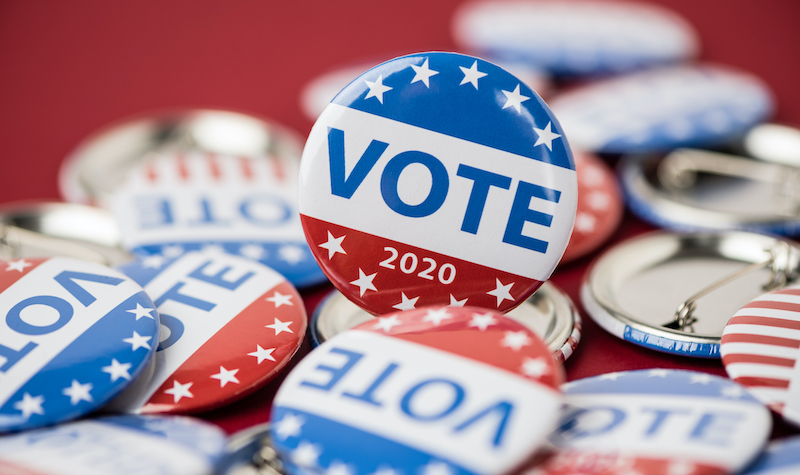
The FCC gives political campaigns the long-awaited green light on peer-to-peer text messaging.
“Hi Regina, this is Pennie with the Philadelphia City Council. Election Day is TODAY! Do you know where your polling place is? I would be happy to provide you with this important information.”
Sound familiar?
In an election cycle that has virtually halted door-to-door canvassing due to the COVID-19 pandemic, political campaigns have been forced to find new ways to connect with potential voters. Texting—or peer-to-peer text messaging—has become the new political secret weapon of choice.
Peer-to-peer text messaging allows campaign volunteers and staff members to engage in meaningful one-on-one conversations with a high volume of voters in a short amount of time.
In 2016, the Sanders campaign popularized this campaign strategy by sending thousands of personalized messages on a new technology platform called Hustle. Over the last four years, local and national political campaigns have followed suit, using additional platforms such as GetThru, RumbleUp, and Opnsesame to connect with millions of potential voters and volunteers.
But as the popularity of peer-to-peer text messaging continued to rise after the 2016 election, so too did the worry of the platform leaders that their technologies were not compliant with Federal Communications Commission (FCC) rules.
The platforms were treading in regulatory gray area—relying on outdated language in the Telephone Consumer Protection Act.
The Telephone Consumer Protection Act provides the regulatory framework for campaign phone calls and general messaging rules. The law prohibits individuals from making calls using any “automatic telephone dialing system” unless the call was made for emergency purposes or with the prior consent of the called party.
The law defines an “automatic telephone dialing system” as any technology that has the capacity to store or produce telephone numbers that can be dialed using a sequential or random number generator.
The repeated references to phone calls within the law reveal its age; it was passed in 1991, well before the proliferation of smartphone text-messaging capabilities. Defined rules for “texting” were thus left out of the law.
In the absence of clearly defined rules, the leading peer-to-peer text messaging platforms sought clarification from the FCC on whether the automatic dialing call rules also applied to text-based communications.
In May 2018, the P2P Alliance —a group of providers and users of peer-to-peer texting services—filed a petition with the FCC seeking clarification on the standards applicable to texting. The petitioners argued that peer-to-peer text messaging should be exempt from the automatic dialing rules because each text message is sent by a real person to a single recipient and the platforms do not facilitate the automated initiation of messages to a list of recipients.
The petition generated a lot of attention from various constituencies. The Republican National Committee filed a comment expressing its “strong support” of the petition and urging the FCC to “tread lightly when it comes to regulating political speech.”
In contrast, a coalition of consumer groups, including the National Consumer Law Center and the Consumer Federation of America, submitted a letter to the FCC opposing the P2P Alliance petition. The coalition members argued that granting the petition would “mark a major setback in the Commission’s efforts to address unwanted and illegal robocalls and robotexts.”
This past June, the FCC broke its silence on the issue—and ultimately gave the P2P Alliance the green light it desired.
The FCC declaratory ruling clarified that if a texting platform “is not capable of originating a call or sending a text without a person actively and affirmatively manually dialing each one, that platform is not an autodialer.” In effect, this ruling affirmed that peer-to-peer text messaging is distinct from automatic dialing systems because the platforms rely on individuals to hit “send” on each message.
As peer-to-peer text messaging campaigns ramped up in the final days of the 2020 election cycle, this favorable ruling has given P2P Alliance platforms confidence that their actions are in compliance with the Telephone Consumer Protection Act. Hustle has even created an “FCC FAQ” page on its website, affirming that “there is no capacity in the platform to send auto dial text.”
The FCC has also created a consumer webpage that summarizes the key information from the June ruling.
Attention to peer-to-peer text messaging has been particularly high this campaign cycle, perhaps due to early research showing that peer-to-peer text messaging increases voter participation. In comparison to email and direct mail, peer-to-peer text messages are more noticeable to would-be voters. On average, Americans check their smartphones 52 times per day.
RumbleUp cites a 95 percent open rate of texts and an average response time of 90 seconds. Higher open rates seem to correlate with higher voter participation. One study found that, in 2018, registered voters aged 27 to 50 who received text messages encouraging them to vote turned out to vote at a rate almost 8 percent higher than voters in that same age range who did not receive texts.
Early estimates predict that, by the time the polls close tonight, Americans will have received 3 billion peer-to-peer text messages and robocalls over the course of the 2020 campaign cycle. Since June 2020, Republican-affiliated campaign groups have sent over six times the number of peer-to-peer text messages sent by their Democratic counterparts. Democrats have worked to close this gap in recent days, sending almost 1 billion texts in the month of September.
Just how much will peer-to-peer text messaging impact the 2020 general election in the United States? Time will tell.



